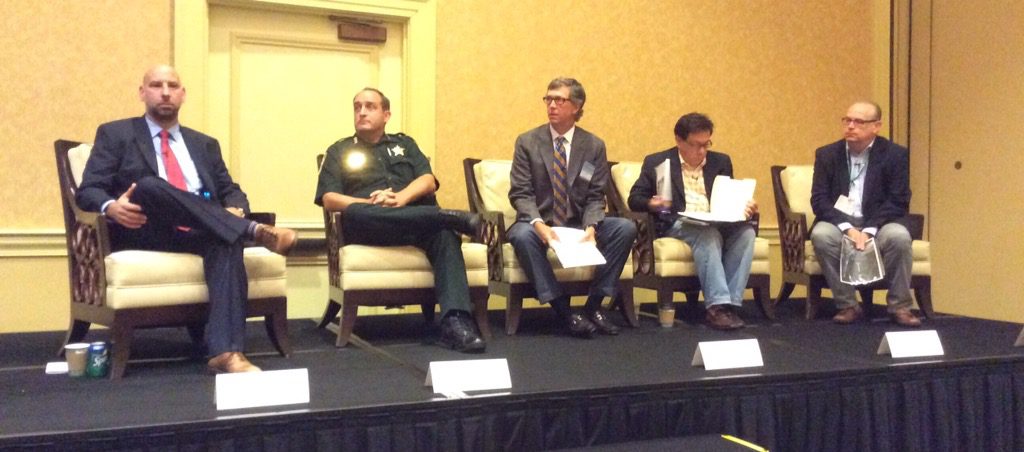Medical Marijuana – Beyond the Obvious
At the 2016 SAWCA Annual Conference, a panel discussed a variety of issues associated with medical marijuana. The panel was:
- Dr. Robert Howell – Georgia GHSE
- Eric Haines – Chief Deputy – Escambia County Sheriff’s Office
- Michael Minardi – Chairman – Regulate Florida
- Reggie Garcia – United for Care
- Tom Glasson – Government Affairs Officer – AIG
- Paul Tauriello – Colorado Division of Workers’ Compensation
Recreational marijuana has been legal in Colorado for 3 years now. Last year the marijuana industry in Colorado generated $996 million in revenue. This resulted in around $200 million in tax revenues for the state. While this may seem like a large number, it is really a very small percentage of the state budget. With tobacco, for every $1 in taxes collected there is $10 in costs to the system including healthcare and regulatory costs. Is marijuana producing a better ratio or is the costs of regulating legalized marijuana higher than taxes collected from its sale?
Alternative to Opioids?
The issue with considering marijuana as an alternative to opioids is that there is no science to support this. Since marijuana is a Schedule 1 drug, there has been no credible testing and studies about its effectiveness for different conditions. Any other prescription medication has to go through extensive testing to be approved. Published articles on this topic are very unscientific and tend to be more driven by personal opinion rather than actual scientific fact.
The question becomes can we stop the opioid epidemic by substituting medical marijuana? The answer is that this is doubtful. Test subjects report a 30% reduction in pain with marijuana. It is likely that instead of replacing opioids, medical marijuana would be used in addition to it.
The addictive qualities of opioids are very well known and some argue marijuana does not have these same addictive qualities. Statistics in Colorado show a 33% reduction in opioids by marijuana users. Some studies show one in eight users of marijuana become addicted so there is a debate over whether substituting one drug for another actually has a medical benefit.
Pharmaceutical companies have been some of the leading opponents of expanding medical marijuana laws, and many feel this is an effort to protect their own interests. When marijuana is ultimately reclassified by the Federal government, many expect the big Pharma companies will be looking to produce marijuana based prescription drugs.
Impairment in the Workforce
The biggest challenge around marijuana is how we gauge impairment in the workforce. This is not just an issue with marijuana but with alcohol and also prescription medications. It is becoming increasingly challenging for employers to ensure the safety of their workforce by taking steps to detect and prevent impairment. OSHA is making this even more difficult as they are seeking to significantly limit post-injury drug testing.
The Battle for Legalization
In 2014 in Florida, 58% of the voters favored medical marijuana. This fell short of the 60% required to pass the constitutional amendment. This issue is on the Florida ballot again in 2016 and it is expected to reach the 60% threshold this time.
Florida is just one example. Every year more states are examining this issue. Those with medical marijuana are looking to expand what conditions it applies to. And states without medical marijuana are considering whether to allow it. Currently 25 states allow medical marijuana, and 4 states have legalized recreational marijuana.
Although marijuana is technically illegal under Federal law, the Federal government is taking a hands-off approach to law enforcement around this and is letting the states make decisions on this issue. Their biggest concern for Federal law enforcement is not allowing illegal trafficking of marijuana between states. The next big question is when the Federal government will reclassify marijuana so that it is legal for use. With most states allowing medical marijuana and most people in the country favoring legalization of marijuana it seems like it is just a matter of time before it is legalized nationwide. Reforming Federal marijuana laws is part of the Democratic Party platform in 2016.
Insurance Industry Concerns
Legalized marijuana has been a cash-only business. This is because the drug is still classified as illegal under Federal law, which means you cannot pay for it using the federal banking system. New Mexico has allowed medical marijuana under workers’ compensation, but carriers are still challenged in how to pay for this. Right now, the only way carriers can do this is reimburse the injured workers.
There are also concerns about the lack of science behind medical marijuana. Why should the insurance industry be required to pay for a “medication” that is completely unproven.


